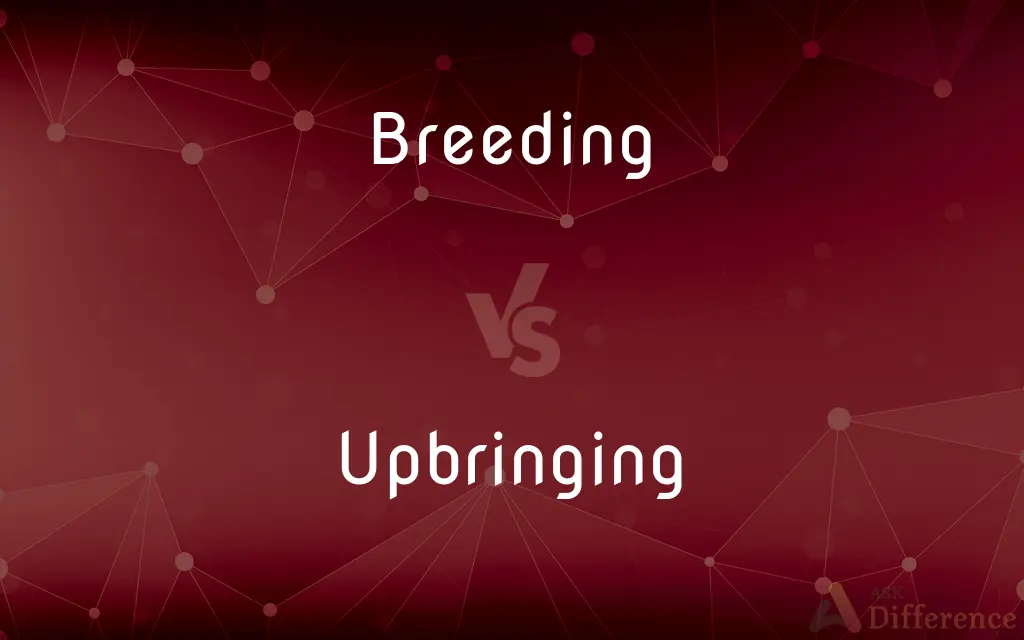Breeding vs. Upbringing — What's the Difference?
By Tayyaba Rehman & Fiza Rafique — Updated on April 15, 2024
Breeding typically refers to controlled genetic selection in animals or plants, while upbringing is about nurturing and raising a child or animal to maturity.

Difference Between Breeding and Upbringing
Table of Contents
ADVERTISEMENT
Key Differences
Breeding involves the deliberate mating of organisms to produce specific genetic traits, focusing on biological characteristics. Upbringing, on the other hand, deals with the environmental and educational aspects of a child’s or young animal's development.
In breeding, the goal is often to enhance certain desirable features, such as physical attributes or disease resistance. In contrast, upbringing emphasizes moral, social, and intellectual development.
Breeding can be applied to both plants and animals, using techniques like cross-breeding or selective breeding. Upbringing, whereas, is primarily associated with humans and domestic animals, involving guidance and education.
The outcomes of breeding are generally predictable and can be seen in the physical or genetic traits of offspring. Whereas, the results of upbringing are more variable, influenced by personal experiences and external environments.
In the context of agriculture or animal husbandry, breeding is crucial for improving stock or crop yields. Upbringing, on the other hand, plays a vital role in shaping the personality and abilities of an individual.
ADVERTISEMENT
Comparison Chart
Definition
Controlled mating to produce specific traits
Raising and nurturing to maturity
Primary Focus
Genetic qualities
Educational and environmental influences
Applicability
Plants and animals
Humans and domestic animals
Techniques
Cross-breeding, selective breeding
Education, guidance, emotional support
Predictability of Outcomes
High (genetic traits)
Variable (personal development)
Compare with Definitions
Breeding
Pertaining to the upbringing and cultivation of manners; often used metaphorically.
His noble breeding is evident in his behavior.
Upbringing
Involves imparting moral values and habits.
Their upbringing emphasizes honesty and hard work.
Breeding
The cultivation of desirable traits through genetic selection.
Wheat breeding aims to enhance yield and disease resistance.
Upbringing
The process of developing the behavior and personality of an individual.
Her artistic upbringing influenced her career choice.
Breeding
The process of mating and producing offspring, particularly with controlled conditions in animals or plants.
The breeding of pedigree dogs requires careful selection of parents.
Upbringing
Related to the social environment in which a person is raised.
His upbringing in a multicultural neighborhood was enriching.
Breeding
A noun describing the overall process of reproduction in biology.
The breeding season for many birds coincides with the warmest months.
Upbringing
The care and training of young children by parents or guardians.
His upbringing was strict but fair.
Breeding
Related to lineage or ancestry in humans.
She comes from a family of high breeding.
Upbringing
The combination of education and parental guidance.
Her parents ensured she had an upbringing rich in both academic and extracurricular activities.
Breeding
The mating and production of offspring by animals
The flooding of the rivers is a trigger for breeding to start
Upbringing
The rearing and training received during childhood.
Breeding
The good manners regarded as characteristic of the aristocracy and conferred by heredity
That's the kind of modesty you get from good breeding
Upbringing
The traits acquired during one's childhood training
Breeding
One's line of descent; ancestry
A person of noble breeding.
Upbringing
The raising or training of a child.
Through her upbringing, Mildred's father had carefully programmed her to expect very little from life.
Breeding
Upbringing or education, especially in proper social behavior.
Upbringing
Properties acquired during a person's formative years
Breeding
The production of offspring or young
Measures to control the breeding of mosquitoes.
Upbringing
Raising someone to be an accepted member of the community;
They debated whether nature or nurture was more important
Breeding
The propagation of animals or plants
A farm devoted to the breeding of horses.
Breeding
The act of insemination by natural or artificial means.
Breeding
The act of copulation in animals.
Breeding
The good manners regarded as characteristic of the aristocracy and conferred by heredity.
Breeding
Nurture; education; formation of manners.
Breeding
Descent; pedigree; extraction.
Your dog has good breeding.
Breeding
Of, relating to or used for breeding.
Your toothbrush is a breeding ground for bacteria.
Breeding
Present participle of breed
Through genetic manipulation and harsh training, I am breeding a species of super-dogs to take over the world.
Breeding
The act or process of generating or bearing.
Breeding
The raising or improving of any kind of domestic animals; as, farmers should pay attention to breeding.
Breeding
Nurture; education; formation of manners.
She had her breeding at my father's charge.
Breeding
Deportment or behavior in the external offices and decorums of social life; manners; knowledge of, or training in, the ceremonies, or polite observances of society.
Delicacy of breeding, or that polite deference and respect which civility obliges us either to express or counterfeit towards the persons with whom we converse.
Breeding
Descent; pedigree; extraction.
Honest gentlemen, I know not your breeding.
Breeding
Elegance by virtue of fineness of manner and expression
Breeding
The result of good upbringing (especially knowledge of correct social behavior);
A woman of breeding and refinement
Breeding
Raising someone to be an accepted member of the community;
They debated whether nature or nurture was more important
Breeding
The production of animals or plants by inbreeding or hybridization
Breeding
Producing offspring or set aside especially for producing offspring;
The breeding population
Retained a few bulls for breeding purposes
Common Curiosities
How does upbringing affect a person's development?
Upbringing plays a critical role in shaping a person’s character, behavior, and overall personality through environmental and educational influences.
What is breeding in biology?
Breeding in biology refers to the controlled mating of organisms to produce offspring with specific, desirable traits.
Is upbringing only relevant to humans?
Primarily, upbringing refers to humans, but it can also apply to the raising and caring for domestic animals, particularly pets.
What are common goals of breeding programs?
Common goals of breeding programs include enhancing specific physical traits, improving health and disease resistance, and increasing productivity or performance in agricultural settings.
Can good breeding affect the temperament of animals?
Yes, good breeding can positively affect the temperament of animals, particularly in dogs and horses, where selective breeding can encourage traits like gentleness, loyalty, or suitability for certain work.
Can upbringing influence the genetic traits of an individual?
While upbringing does not change genetic traits, it significantly influences personality development, behaviors, and skills.
What role does education play in upbringing?
Education plays a central role in upbringing, contributing to cognitive development, moral reasoning, and social skills, thereby preparing individuals to navigate and contribute to society effectively.
What are the main techniques used in animal breeding?
Animal breeding techniques include selective breeding, cross-breeding, and sometimes genetic engineering.
How does the concept of upbringing differ culturally?
The concept of upbringing varies significantly across cultures, affecting the values, traditions, and educational methods imparted to children, reflecting each society's unique cultural norms.
Is breeding ethical in all contexts?
The ethics of breeding can be controversial, particularly concerning issues like genetic manipulation, the welfare of bred animals, and biodiversity impacts. The appropriateness of breeding practices often depends on the intent, methods used, and the care provided to the animals involved.
Share Your Discovery

Previous Comparison
Amigo vs. Compadre
Next Comparison
Grain vs. HayAuthor Spotlight
Written by
Tayyaba RehmanTayyaba Rehman is a distinguished writer, currently serving as a primary contributor to askdifference.com. As a researcher in semantics and etymology, Tayyaba's passion for the complexity of languages and their distinctions has found a perfect home on the platform. Tayyaba delves into the intricacies of language, distinguishing between commonly confused words and phrases, thereby providing clarity for readers worldwide.
Co-written by
Fiza RafiqueFiza Rafique is a skilled content writer at AskDifference.com, where she meticulously refines and enhances written pieces. Drawing from her vast editorial expertise, Fiza ensures clarity, accuracy, and precision in every article. Passionate about language, she continually seeks to elevate the quality of content for readers worldwide.
















































